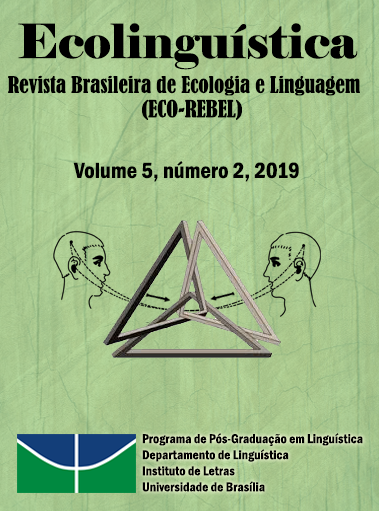Adam Makkai
Resumo
Adam Makkai was born in Hungary (1935). He went to the United States in 1957, where he began teaching German, Russian, French, and Latin. He completed his Ph.D. in General Linguistics in 1965, with a dissertation which became the book Idiom Structure in English (The Hague: Mouton, 1972). By this time Makkai used Sydndy Lamb's theoretical model of stratificational linguistics, now known as neurocogintive linguistics. In this context, in 1974 he founded the Linguistic Association of Canada and the United States (LACUS), whose symbol is "the Great Lakes, providing a natural border between Canada and the United States", standing "for more than the convenience of acronymy. Most of his academic career was spent at the University of Illinois in Chicago (UIC) of which he became Professor Emeritus. He received several awards, as the Presidential Gold Medal from the President of Hungary (1999). Makkai and Alwin Fill are the authors of the first two introductions to ecolinguistics ever to be written, the former in English and the latter in German. Makkai's introduction is mentioned in the first question below. The first three ecolinguistics anthology published in Europe have one chapter written by him. These are: 1) "Die Welt als Bewusstsein und Paraphrase: zur gesamtökologischen Fundierung des menschlichen Sprachverständnisses mit besonderer Berücksichtigung der Sprachphilosophie Wilhelm von Humbolts und ihrer Relevanz für die theoretische Sprachwissenschaft des 21. Jahrhunderts", published in Fill, Alwin (ed.). Sprachökologie und Ökolinguistik (Tübingen: Stauffenburg, 1994, p. 77-91); 2) (with Valerie Becker Makkai): "The case for ecolinguistics", in Kettemann, Bernhard & Penz, Hermine (eds.). ECOnstructing language, nature and society (Tübingen: Stauffenburg, p. 105-117; 3) "The role of the human voice in the eco-semantics of human interaction", in Fill, Alwin; Penz, Hermine & Trampe, Wilhelm (eds.). Colourful green ideas (Bern: Peter Lang, p. 219-236). In ECO-REBEL Makkai published two articles: 1) Porque **ecolinguística**, v. 1, n. 1, 2015, p. 22-37; 2) Da gramática pragmo-ecológica à ecolinguística (1973-1993) v. 2, n. 2, 2016, p. 37-41. More information on Makkai's professional activities are available in Louise O. Vasvári's article "Ádám Makkai: Polyglot linguist, poet and literary translator between languages", published in Hungarian Cultural Studies: e-Journal of the American Hungarian Educators Association, Volume 6 (2013): http://ahea.pitt.edu DOI: 10.5195/ahea.2013.178 (accessed in 14/05/2019). This interview take place between 2002 and 2004.
Downloads
Downloads
Publicado
Como Citar
Edição
Seção
Licença
Autores que publicam nesta revista concordam com os seguintes termos:
Autores mantêm os direitos autorais e concedem à revista o direito de primeira publicação, sendo o trabalho simultaneamente licenciado sob a Creative Commons Attribution License o que permite o compartilhamento do trabalho com reconhecimento da autoria do trabalho e publicação inicial nesta revista.
Autores têm autorização para assumir contratos adicionais separadamente, para distribuição não exclusiva da versão do trabalho publicada nesta revista (ex.: publicar em repositório institucional ou como capítulo de livro), com reconhecimento de autoria e publicação inicial nesta revista.
Autores têm permissão e são estimulados a publicar e distribuir seu trabalho online (ex.: em repositórios institucionais ou na sua página pessoal) a qualquer ponto antes ou durante o processo editorial, já que isso pode gerar alterações produtivas, bem como aumentar o impacto e a citação do trabalho publicado (Veja O Efeito do Acesso Livre).



3.png)



